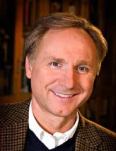Authors as Desserts II
2 weeks ago I wrote a blog post about authors and the desserts that in my opinion they/their writing corresponds to. Here is Part II.
Chuck Palahniuk

Palahniuk is a controversial, transgressive author whose writing is not for the fainthearted.
Corresponding dessert: Dirt Cake

(Courtesy of Visions of Sugar Plum)
Rationale: This aptly named dessert is created by combining unusual, and some might argue unpalatable ingredients, including Oreo cookies, cream cheese and Gummy Worms.
George Orwell

Orwell was an iconic British author with socialist tendencies.
Corresponding dessert: Bread and Butter Pudding

(Courtesy of BBC Good Food)
Rationale: This simple, traditional British fare is popular with the masses.
Jackie Collins

Jackie Collins is one of the best-selling Romance authors of all time.
Corresponding dessert: Black Forest Gâteau

(Courtesy of Wikipedia)
Rationale: This decadent dessert leaves one feeling nauseous.
Haruki Murakami

Murakami is Japan’s most famous contemporary writer.
Corresponding dessert: Matcha (green tea) Ice Cream

(Courtesy of Youtube)
Rationale: Westerners have enthusiastically embraced this distinctly Oriental flavour, presented in a familiar form.
Danielle Steele

Corresponding dessert: Cupcake

(Courtesy of Esciencelog)
Rationale: A dollop of icing fails to disguise what is a meagre offering.
C. S. Lewis

The creator of The Chronicles of Narnia was a devout Christian.
Corresponding dessert: Hot Cross Bread and Butter Pudding

(Courtesy of Tesco)
Rationale: This variation on the hot cross bun is ideal fare to mark the end of Lent.
Bram Stoker

Irish author Bram Stoker is best remembered for his Gothic novel Dracula.
Corresponding dessert: Red Velvet Slaughter Cake

(Courtesy of Huffington Post)
Rationale: Self-explanatory
Vladimir Nabokov

The intellectual Russian born Nabokov utilised an ornate prose style.
Corresponding dessert: Deconstructed S’more

(Courtesy of OC Foodies)
Rationale: This sophisticated, deconstructed extravagance contains caramelised vanilla marshmallow, soft salted caramel and chocolate-coated cereal garnishes.
Click here to sign up for my newsletter.
Click here for Part III.




 (Courtesy of
(Courtesy of 
 (Courtesy of
(Courtesy of 
 (Courtesy of
(Courtesy of 
 (Courtesy of
(Courtesy of 
 (Courtesy of
(Courtesy of 
 (Courtesy of the internet)
(Courtesy of the internet)

 (Circa 446 BC – 386 BC)
(Circa 446 BC – 386 BC) (July 10th 1640 – April 16th 1689)
(July 10th 1640 – April 16th 1689) (November 21st 1694 – May 30th 1778)
(November 21st 1694 – May 30th 1778) (August 28th 1749 – March 22nd 1832)
(August 28th 1749 – March 22nd 1832) (January 29th 1737 – June 8th 1809)
(January 29th 1737 – June 8th 1809) (September 11th 1885 – March 2nd 1930)
(September 11th 1885 – March 2nd 1930) (April 22nd 1899 – July 2nd 1977)
(April 22nd 1899 – July 2nd 1977) (December 16th 1775 – July 18th 1817)
(December 16th 1775 – July 18th 1817) (August 30th 1797 – February 1st 1851)
(August 30th 1797 – February 1st 1851) (November 22nd 1819 – December 22nd 1880)
(November 22nd 1819 – December 22nd 1880) (10th December 1830 – 15th May 1886)
(10th December 1830 – 15th May 1886) (January 24th 1862 – August 11th 1937)
(January 24th 1862 – August 11th 1937) (January 25th 1882 – March 28th 1941)
(January 25th 1882 – March 28th 1941) (September 15th 1890 – January 12th 1976)
(September 15th 1890 – January 12th 1976) (January 7th 1891 – January 28th 1960)
(January 7th 1891 – January 28th 1960) (November 8th 1900 – August 16th 1949)
(November 8th 1900 – August 16th 1949) (April 4th 1928 – May 28th 2014)
(April 4th 1928 – May 28th 2014) (October 27th 1932 – February 11th 1963)
(October 27th 1932 – February 11th 1963)
































